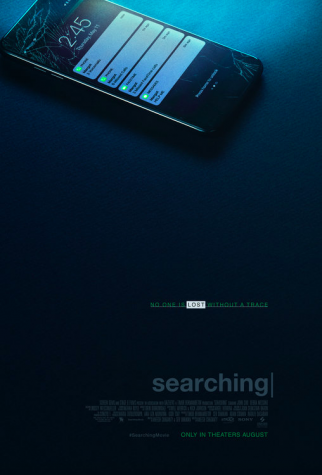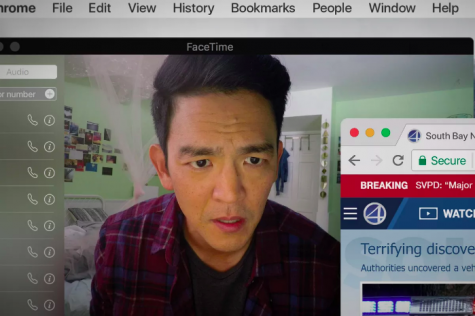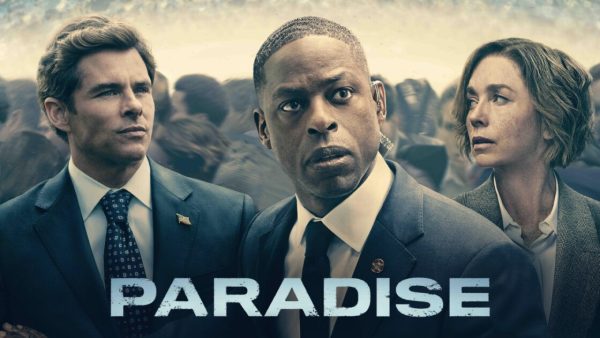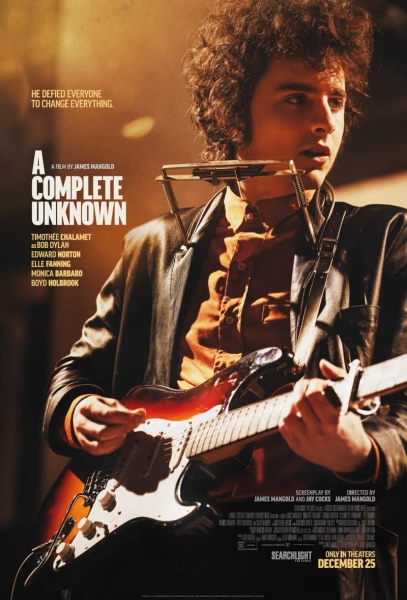Found-footage film ‘Searching’ achieves thrills, shock

Found-footage films have become a bit of a horror gimmick at this point (that’s an understatement). Ever since The Blair Witch Project in 1999, tiny production companies have been pumping straight to video trash on shoestring budgets in hopes that their gimmick will draw in a couple misguided viewers. However, thankfully, this practice began to dissipate as little success was found.
Eventually, a new form of this style of filmmaking would emerge in 2013. A small and under-the-radar short film called Noah took place entirely on a computer screen. Each move of the mouse was thoroughly intriguing, as even the slightest of movements carried waves of emotionality behind them. The success of this style was not fully realized until the next year, when this time a small-budget horror feature called Unfriended took place almost entirely on a computer screen. The film was a massive success financially, raking in $64 million and getting decent, yet mixed, reviews. All this paved the way for a new film in 2018 in the same style known as Searching.
After David Kim (John Cho)’s 16-year-old daughter goes missing, a local investigation is opened and a detective (Debra Messing) is assigned to the case. But 37 hours later and without a single lead, David decides to search the one place no one has looked yet, where all secrets are kept today: his daughter’s laptop. In a hyper-modern thriller told via the technology devices we use every day to communicate, David must trace his daughter’s digital footprints before she disappears forever.
The first thing that you notice as this film gets underway is that its style is by no means a gimmick. Films that stick so heavily to a style like this often fail in this regard, and it is hard not to be taken out of the film. However, first-time director Aneesh Chaganty brings a fresh take to the relatively young niche genre that is immediately evident. Crime-thrillers like this one tend to require a lot of exposition, as it necessary for character motivations and relationships to be understood at least on a surface level. Too much time spent on exposition is quite the bore, and too little time spent on it can be careless and cause the story to be underdeveloped, so there is a fine line for films that want to do it right. Despite this obstacle, Chaganty knocks it out of the park, launching the audience into the digital world right from the start. It begins by going back through the family’s whole life up to that point through home video files, calendar updates, Google searches, etc. Each movement of the mouse, each typed or deleted phrase brings with it the brutal honesty of the character at that moment, as nothing is hidden from the audience apart from their face. This establishes an emotional backbone to a story that would not have survived without it.

Furthermore, the weight of this emotional backbone rests heavily on its actors. Only a few actors have notable screen time, including John Cho as the father (David Kim), Michelle La as the missing daughter, Debra Messing as the detective, and Joseph Lee as David Kim’s brother. Michelle La is incredibly cryptic and evasive in her sparse appearances, clouding the entire mystery and the motivations of anyone possibly involved through her shifty ways. Debra Messing is passionate, focused, and somewhat secretive herself, adding to the emotionality of the investigation as a whole. The overwhelming majority of the emotional weight, however, falls on John Cho’s shoulders. An incredibly underappreciated actor, Cho wowed last year in a relatively unknown indie film called Columbus, and his rise seems to have only continued up from there. Everything Cho does on screen is unbearably palpable. The sheer exhaustion is evident in his eyes, and his bouts of depression, regret, and rage as the plot develops draw the audience even deeper into the story.
In a crime thriller like this one, the story is essential in keeping the audience on the edge of their seat. Plot twists are a must, but similar to the situation with exposition, there is a fine line between overuse and underuse. A crime thriller with too few shocking plot points can grow boring, causing the audience to question why it was even made in the first place. However, if a “shocking” plot twist rears its head every ten to fifteen minutes, all elements of storytelling go out the window and the film transforms into an overdramatized telenovela. In this regard, Searching, once again hits the mark with flying colors, although you won’t get any hints from me. Let’s just say that when the film is over, you will be picking up on so many little clues that nestled deep into the back of your mind and feel like a full-blown online sleuth.
The most essential evocations that a thriller like this one must bring are shock and horror. Searching does this brilliantly and frequently, in a creative and fresh style that adds to the intrigue only further. I’m giving it four and a half stars out of five.

PJ Knapke is a senior at Glenbard West and a Columnist this year for the newspaper. His focus on is on film-related content, particularly reviews. He is...








